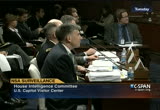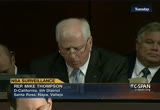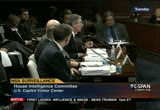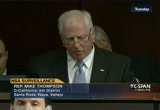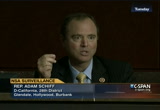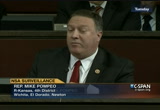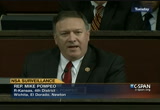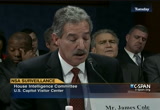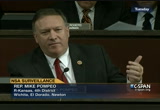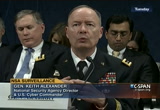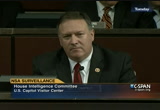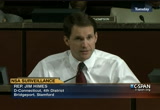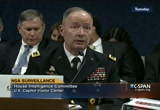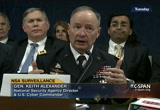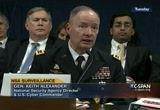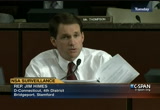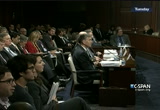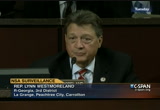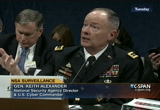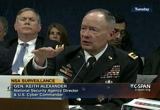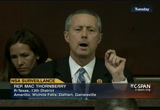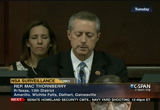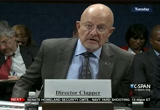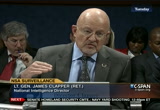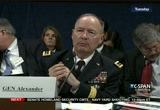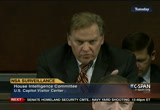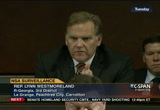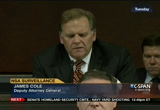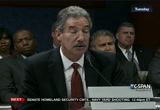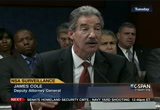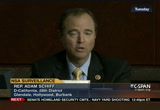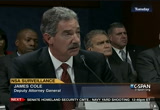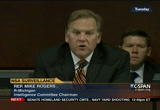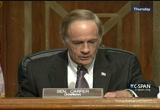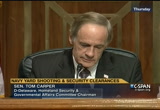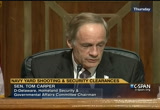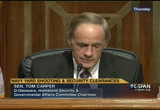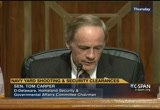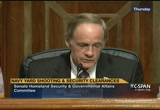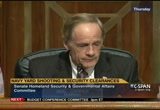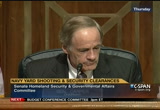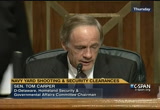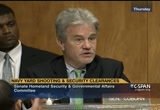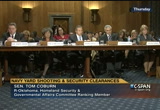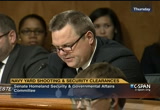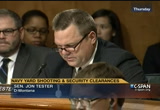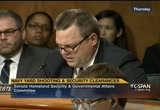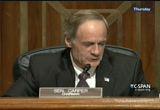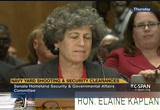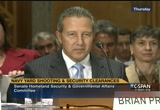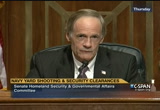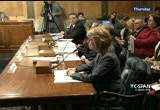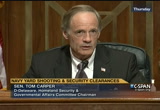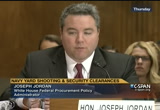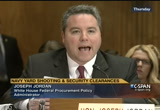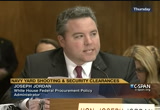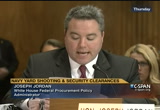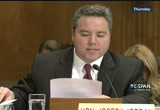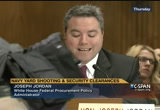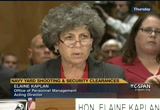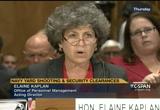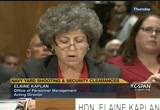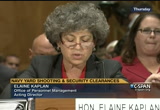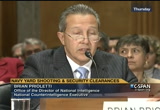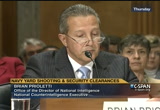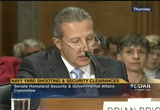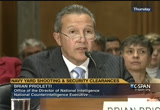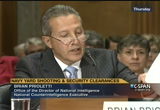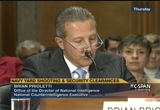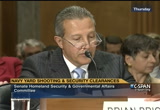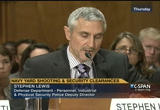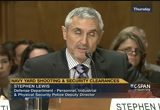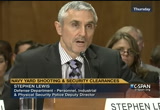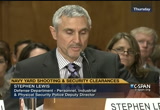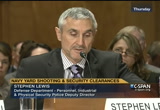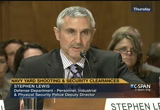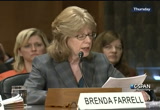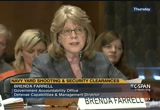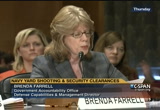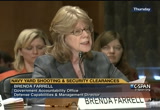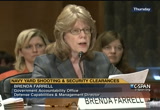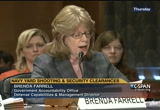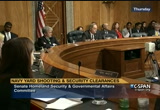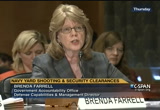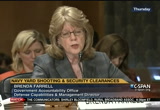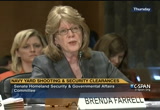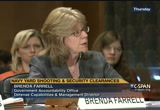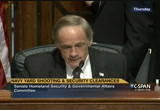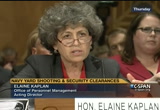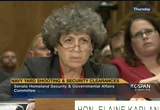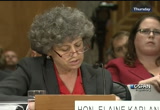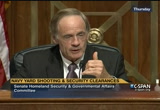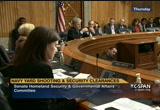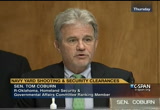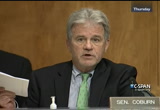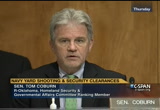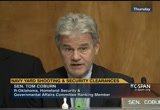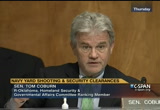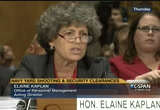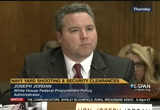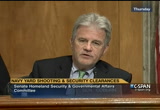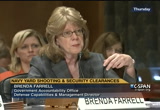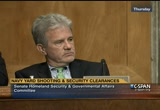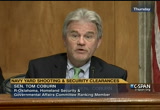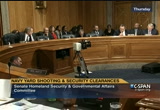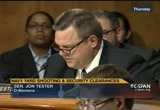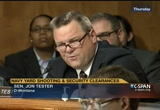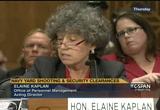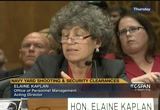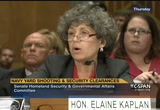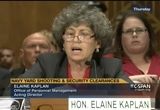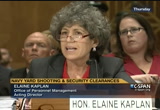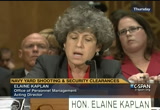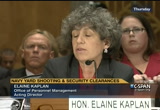tv Washington This Week CSPAN November 2, 2013 12:00pm-2:01pm EDT
12:00 pm
>> thank you very much. thank you to all the witnesses who were here today. some of us believe that we should -- we being the relative committees of jurisdiction -- more on our end. we want to change the fisa law. we do not want to send letters critiquing how you do or don't do your job, and then we only learn about it when more intelligence is disclosed from leakers. i want to know -- and this would also require all denials and modification of fisa orders and any new or changed legal interpretation of fisa. i would like to know from you,
12:01 pm
and we will start with general alexander, would there be any arm sources and methods of >> i am notchange? familiar with this. not that i know of. least, the way you have described it, giving access to the committee on certain things, it is our intent, any time we see something significant like that, to report it to the committee. it seems to me they have a different window -- a better window -- on what is going on, and anything they see as an issue should be shared with us. so if there need to be changes made, we could do that. mr. cole? >> congressman, think the real issue comes down to what is in the application, what is in order, what is in the filing in the fisa court, and that may implicate sources and methods,
12:02 pm
and the nature of that disclosure is going to be unique to each different document that we are talking about. ways for us to keep them classified, not allowed them to be public from the things of that nature, we are the intelligence committee. >> i understand that. number of fisa a orders and applications and opinions and things of that nature that have been released and made public after redaction's that are appropriate . i know there are continuing efforts in that regard. it is just balancing those kinds of issues. wei just want to say that need to do everything we can to ensure that our members get the him permission we need -- the information we need. there are two different newspapers today reporting that the chairman of the senate intelligence committee has that the has stated
12:03 pm
senate intelligence committee was not satisfactorily informed, and it hampers our ability to do proper oversight. i think we need to work collaboratively to make sure we i would like to yield my remaining time to mr. schiff. >> i thank the gentleman for yielding. i will be very quick. we have been talking about selectors. not all selectors are equal. cannot speak for other members of the committee, but i would be very surprised if there are any -- apart from the chairman -- who are aware of this, that it was going on. it is not for lack of doing homework by committee members. i think we need to have a broader discussion about the requirements of the committee when programs have the capacity for the kind of blowback this has had.
12:04 pm
the covert action area, when there is a covert action contemplated that would have significant blowback if it was discovered, we have a discussion about it and notification hearing congress, and i don't think the standard should be any different in terms of our intelligent sectors. i thank the gentleman and yield back. >> i have one comment and then what i think will be a couple of quick questions. i have only been on the committee a little while. lots of times i have seen information and ask questions about, where did this come from? how did you know? what was the source? who told you? and in every single case, i have been provided with that information. sometimes it is in written form. i have to go downstairs, do a little bit of work. i have heard folks say today hey, there is a deep distrust for what is going on in our intelligence community today.
12:05 pm
i think policymakers who feign thatance and say things they know, with a little bit of work, they would have been able to obtain things. backers for the white house as well. folks in the white house -- that goes for the white house as well. folks in the white house will in ai wish we had it program. we are going to do a full review. folks all across the capital are doing in a norm us amount of oversight. i think we do and the norma's -- an enormous disservice to ourselves by saying we need to go fix that. sometimes we need to just go do our own work. sometimes we need to say yes, there are things we know and i wish we could share them in
12:06 pm
places where we cannot share them. to do that, but to always respond with, just one more process, just one more level of oversight, is not going to get us to where we want to get to. there has been a suggestion with respect to the pfizer courts that there would be this --udsman -- pfizer courts fisa courts that there would be this ombudsman. i have to westerns about that on a practical matter. two questions about that on a practical matter. where would this person be and where would we place them? hit toink you have issues regarding standing, where they would fit within the three government.
12:07 pm
the suggestion we have looked at that we thought would be most useful is a case-by-case determination by the court of raising an amicus to determine a point of view that may not be raised by the parties. >> judges will do that from time to time. do the fisa judges have the opportunity to ask or professional help? i think that is what you are asking. >> i believe they do and i have seen it in any number of courts, including the supreme court of the united states. >> thank you, then i just want to come to one other matter. general alexander, we talked putting this metadata somewhere else, putting it in a place outside of government. , members of congress are trying desperately to make sure government doesn't keep
12:08 pm
that data. in other times, they want to make sure it is released. sometimes they are holding on until there is a statue to make sure they can't hold on to the data. what powers would you have to make sure that these providers promote an appropriate level of security for this data? a other words, do you have process in place to secure it. if it is outside of your control, what authority would you have to make sure that they protected the data in a sufficient way? >> that is something we would have to work with the court and congress to make sure that is , and undere statute what conditions and authorities we would receive access. the concern would be then who could actually go in and do a grand jury subpoena. a concern i think people
12:09 pm
have expressed interest on. if i could, i just want to say one thing. i saw you on tv, and it was interesting, a couple of months i think it is for this committee and for the american people an important point. we are talking about something here that is incredibly important to our country. and all of you across both sides of the aisle, better than any place i have seen in congress, have together stood and said we have to do what is right for the country. when everybody was slamming something, i didn't know, i didn't know, you stepped forward and said we did. you did what was right even though it was unpopular to do. you and other members of the committee have all stood up to do that, and i think that is huge. i wanted to thank you for that. >> you're most welcome. on that, i am going to yield?
12:10 pm
-- to yield. worse for yout from there. >> exactly. >> thank you mr. chairman and thank you to the panel for appearing before us. i think i am wrapping up here. i think we are getting into some combination of double digits for you visiting us, so thank you for that. i share your frustration with the misinformation out there, the rumors started and what not. there has been a lot of blame game and whack more. frustrated by these issues of patriotic or non-patriotic, sinister. i think we would all agree on these three things. one, you do essential, life- saving work. two, you have to do that work within a constitutional framework. three, like all institutions composed of mortals, sometimes you don't get it right.
12:11 pm
what i am really interested in is are you getting it right more. as you look at the results of what appears to be very solid compliance and other in terminal control systems. have given a lot of attention, amidst all the rumors and misinformation out there, i have given a lot of attention to the writing of the fisa judges. in 2009, the fisa judges had very strong language with .espect to the program judge walton at the time said the court has no confidence just readell, i will it. to approve such a program, the court must have every confidence doing its bestis to comply. the court does not currently
12:12 pm
have such confidence. this is 2009. it is not current. my question is, number one, if we were to look at the toom 2009,report the present, would we see improvement? two the worse early -- number two, there was fairly strong language from the judges in 2009. would we not see such language used today? >> on the second one first, we are actually having the fisa judges up to nsa tomorrow. will go through and see what our folks do. on the first one, this is where this committee made a mistake.
12:13 pm
thought we had written and the way we meant for information to go into it was not the way we represented that to the court in multiple representations. translatingtake in a technical to a legal framework. what i told the committee for years ago, i think the people who made that mistake made an honest mistake. i had those people in my room. said ok,to them, and i that is an honest mistake. we carried them forward. we looked at it, and we decided jointly with this committee and others that we needed to set up a director of compliance that gives us more rigor in looking at court orders in a way that was technically compliant. we have done that. we are going through the rigorous process. all of our fisa applications are being wire brushed to ensure they are exactly right.
12:14 pm
and of course, while doing that, we are going to find mistakes, and we are rooting them out as wee by mistake. so, finish this up, what that means is we are doing an inspection on every page. compliance isf doing just that. we report every incident to everybody, so that is what you're seeing. i think what you will see coming out of this next year is that all of a sudden they are going to drop down significantly lower, and i think this is a good thing. that is what you want us to do. >> is that a reflection of a nature -- of the nature of a change between the committee and the judges? >> i think it is. had some very, very uncomfortable meetings. we went with the director of national intelligence up there. at the time, director blair, with the entire court, all 11. then we went to the white house.
12:15 pm
then we went to you all on multiple occasions, and everybody was walk through on that. opinion from the court, if you're asking me to give you that. i think what they see as we are trying to do the right thing. there is no malicious intent. we do make mistakes, as you pointed out in number three. we are human. notifysetting up a apparatus that limits that to -- maximum it done possible maximum extent possible. >> before i wind up, having spent some time with judge walton, the judge said something really important in this letter to chairman leahy which, because it was in the sixth footnote on lost.hree, i think was one of the many pieces of misinformation out there is that the fisa court doesn't strub -- scrub these applications. the approval rate for domestic
12:16 pm
theications is higher than approval rate for fisa applications and almost a quarter of the applications are substantively changed in this process. i say that because there seems to be an appreciation on the courts part for their role as well. >> just to clarify, when you talk about notifying the process, during that that was during 2009. that was not recently. during 2009, these issues were highlighted to the court, the white house, the respective oversight committees. want to make sure that is accurate. that is accurate, but the wounds of the wire brush are still real. >> i understand you use to be 6'4" when you started this. >> i just want to say that you all take the wounds of the wire brush pretty well. you've been up here a number of
12:17 pm
times under the scrutiny of this panel. you know, we find it hard politically when these things keep coming out a little at a and about these mistakes all this information. youess my question is, know, mr. snowden is supposedly the source of all of this information, and we have talked you all before about the level he was at and how he would have knowledge.f i know some of the things being put out are not true. as has already been stated here, we know that. it is kind of like fighting with .ne hand tied behind your back mean -- is how -- i
12:18 pm
this just stuffy is making up or was this stuff going on while he was at nsa? >> congressman, he had one of ouraccess as website administrators in hawaii. it was not that he had knowledge, because he clearly didn't understand things about how these tools actually operate, and you can see the misperception from what was .tated collection on a european country had nothing to do with collection on a european country. his job was to administer a website that brought information to nsa hawaii. he did not have access to fisa data or business records to 15 or some of our more sensitive -- to he did get great access the core of our reporting, and he took a lot of that data with
12:19 pm
him, and he has shared that with newspaper reported -- reporters. that is what is being dribbled out, and i believe it is being done in a way that would cause national harm. i don't know why they would want to harm our country, but that is what is happening, and our allies. >> let me ask you this. as far as the information that you collect and store, what is the difference there, because i know that these micro-target others and people that do , theyet ads and whatever know what kind of food we eat. they know what kind of car we drive. they know all different types of information about us. what kind of difference -- different things do they use rather than what you use, because evidently, you use or have access to less information than what they do? difference tos a what we are authorized to --
12:20 pm
remember, we are a foreign intelligence agency. fisa is reason we have to connect the foreign and the domestic. there is no content there. there is no other collection you would get from the other people who operate on the network civilian industry for the purposes they use to protect our credit cards and things like that. we don't need the name. we don't need the content of the u.s. person. all we need to do is associate a number and give that to the fbi and let them deal with that. this is a hugely important point that you brought up, because i think it is important for the american people to understand that we are not collecting the contents of their e-mail or their phones. we are not listening to that. you see that coming around. we don't have that information, nor do we collect that. we have what is in the business record of fisa and what is authorized under a fisa court weren't. -- war and.
12:21 pm
warant. and is a huge point, think a lot of people assume that because we can, we are. but the fact is this system has tremendous oversight and controls. it is focused. and if we make a mistake, even a transition, we report it. and we have not seen anybody, over the -- other than those 12 cases over a decade, of anyone going out and collecting .nformation on u.s. persons and if we find someone doing it, we will hold them accountable, guaranteed. just want to make a point that a lot of private companies in this country have a lot more information on our citizens and what the nsa does and uses some of that information sometimes that may not be the best way we
12:22 pm
would like for that information to be shared. each and everyone of you for what you do for our country. click thank you. -- >> thank you. have been on this committee a little longer than mr. pompeo, but i have to say that throughout the course of this snowden matter, i cannot find any reason to complain to any of you at this table about a lack of notification or a lack of information that you have provided us. have a you have -- if i problem with nsa, it is that you provide us with too much information, and then i have to understand it. actually, you're very good about helping us understand what is going on. just have a brief question, initially. you are listing the four attributes of an architecture.
12:23 pm
you did not say security. i don't know if that is what mr. pepe a was getting too. it is one thing to talk up -- mr. pompeo was getting too. it is one thing to talk about the records. but what about a foreign intelligence service that says there is a fat target. let me go after that. >> i would include that in privacy from all an appropriate access. whether that is someone who has authorized access and might misuse that or someone who is --rating as an added serial as an adversarial intelligence service. >> but it may be that the architecture provides for a warm value target. >> i agree. >> i want to back up and just think about the context of what we are talking about. a couple of years ago at our hearing in this room, you said
12:24 pm
something i will paraphrase. in your 50 years of intelligence, you don't remember a time in which we have had a more complex array of serious national security challenges facing our country. not gottenhat it has any simpler or any safer in those couple of years. and would you, again, put in signal intelligence, the source of stuff we are about here that nsa provides. how much of our understanding of this complex array of national security challenges is provided by the source of information that signals intelligence provides us? >> well, sir, you are quite right. it has not changed in those intervening two years. it has gotten worse. just a thought about a previous that involved a litany
12:25 pm
that we are facing by example, not exhaustion. the things that keep me awake at include preoccupation with these distractions. the amount of time, thousands -- inousands of man-hours fact, the preoccupation of the workforce with all the folderol associated with this, that serves as a major distraction from all of these other substantive threats that exist throughout the world. it is hugely important to the totality of our intelligence effort in this country. after problem after problem, sick and is the major sigant is theor -- major contributor.
12:26 pm
i'm talking about hundreds of targets where it is a crucial player. it is hard to overstate it. kinds ofone all studies on this that empirically ofw the critical importance signal intelligence to the nation and the safety of its people. >> if i could just take one example. wenterterrorism these days, don't do much interrogation for very long anymore. would you say signal intelligence is the primary contributor to what we know about terrorism? >> yes. >> one of the key issues you put out was counterterrorism. there are two threats we have to our country. counterterrorism and ciber. this platform is critical. i think this gets to some of the stuff you and the chairman have been talking toward. i think it is important for this
12:27 pm
country and our allies to figure the framework for how we are going to do this and the future. we're going to need partners. the ways we are seeing people attacked us in cyberspace and with terrorism -- that is how they are going to hurt us. we need to work with our allies to come up with that framework, and that is something we should do. i would like to offer this committee that if you would ever like to bring up a group and do a walk-through of everything we know, it is all open. we will get coffee in the future , depending on the budget. >> we were hoping that would come out of your check. just to clarify, for the record, , somemmittee has gone up on their own, some with a group, and to go through those processes. they are painfully exhausting.
12:28 pm
they include all of the protections, all of the oversight, all of the programs. do several 16 agencies, so the first quarter of our year, and we will do that again coming up, will be spent on .hose activities as i think you know director, that is one of our best times to go through again those checks and balances within your own system, and it is our job to try to relate it to the bigger .ystem when the director of national intelligence comes in, we cap it off. i think it is important to understand how much effort goes into all of these programs every year. and as i said, the budget portion of that, to me, is the best opportunity for this commission to go in line by line, painful line five line test line by line, about those activities and what -- painful
12:29 pm
line by line, about those activities and what you are or are not engaged in. we are encouraging other members to go up and get acclimated to what the nsa is. are justthat these real americans committed to following the law and catching bad guys at the end of the day. real quickly, and we have another panel here it is important we get to. these issues are important. ask thisnted to particular question. some have talked about a permanent advocate in the fisa court. it makes me scratch my head a little bit. i cannot find that anywhere else that we might do it. as a matter of fact, in a criminal grand jury, there is no advocate on behalf of of the person seeking indictment. is that correct? >> that is correct. goes beforewitness
12:30 pm
a grand jury, they are not allowed to go in with an attorney. the closest analogy is the acquisition of a wiretap for domestic criminal law enforcement, and that does not -- adversary process at all. that is just a process with the government or agent going and very similar to the fisa process we have now. >> by design, the court was supposed to be that -- adversary is too strong a word, but to check the compliance with the law and the cons attention, isn't that correct? >> that if the constitution, that is correct. and the constitution, isn't that correct? that is correct. that is the role of the judge. >> and so just to clarify, so a u.s. citizen, you decide that they have risen to the standard of probable cause, you would go to that particular judge, you make that articulation with what you believe that probable cause
12:31 pm
is, the judge would review that for legal propriety, and then either grant or deny the ability for the fbi, let's say in this case, to get a wiretap on a particular phone on a united states citizen. >> that is correct. >> and committing a crime in the u.s. >> that is correct. -- in the u.s.? >> that is correct. what we be adding a higher level of protection for foreign citizens suspected of -- >> wouldn't we be adding a higher level of protection for for since -- for foreign citizens? >> we would be adding a level higher than what is given to u.s. citizens and the criminal courts. we would also be delaying the process and a considerable -- with a considerable amount of time added to appeared. >> that word is concerning to me. i was suggest that the -- are not
12:32 pm
acknowledge us because in an article to record, while there is no adversarial process, when a privileged ride to restitution, there is a process in which the dissent in use a process to have the case thrown out. so actually in article three court, very powerful incentive for an adversarial mode of thinking even without the process. >> i understand you, but we are talking about a new level of standard for a terrorist on foreign soil that we do not provide to a u.s. citizen on any investigation, and if they are brought to an article three court, they have all the same rights and the possibilities within the guidelines of court including discovery, is that correct? >> including discovery and the ability to challenge the fisa warrants to determine whether they were issued properly. >> if i make, a very small fisa-orientede aquarius ultimately wind up in an article three court heard >> this is true, but again i think
12:33 pm
as was pointed out in the hearing in many other countries when they go to intelligence collection, they do not go to court at all. >> for clarification, there has been another suggestion as opposed to having an advocate in the court with outstanding and create some constitutional problems there, that maybe you treated just like a u.s. citizen would be treated in the sense that you would go to a u.s. attorney with that standard for approval to the court versus the national security agency taking the standard to the court. would that make sense? would that be too cumbersome? would that not be walkable? -- workable? >> the reason the standard is used in our system is to -- as for police authors to determine whether they can stop and frisk somebody. they have to have reasonable, articulable suspicion that that person is engaged in some sort of activity that could be illegal. and that is a decision that is made by the cop on the street at the time. it is meant to be a relatively
12:34 pm
low standard, but a protective standard to allow them to do this for public safety. so we are in an area where we are applying it in an area where there is not any constitutional protection. we are applying it in a way that i think needs to be nimble and needs to be consigned to the people who are actually applying it day-to-day. >> mr. chairman, can i add one additional -- >> sure. >> we have a vote at 5:00, and it is important that we get to that panel. >> i think most of the analogies to the criminal court process are really not on point. for the reason that when you go to get a wiretap in a criminal court, you are not asking the court to grant the authority to wiretap the whole country or engage in a whole new broad program of collection. you have a specific target. is, i think, suggesting that in the garden variety pfizer case where you are going off on a single target, a garden-variety --
12:35 pm
garden-variety fisa case where you are going after a garden- variety warrant, bulk metadata -- that is an action where i am not aware of any other court undertaking without at least hearing from another party, and that is why i do not think the criminal an analogy is on point. >> as i understood the chairman's question, he was looking at the individual war and that would be issued for people within the u.s., bb citizens or noncitizens. -- be they citizens or noncitizens i'm a probable cause determination in making that determination. we said all along in something like a novel issue or a boca issue where there is significant privacy concerns that are implicated, that we see an appropriate role for an amicus to come in at that point, as the court sees fit, in order to give the court the benefit of another perspective. we have always talked in terms of that being something that could be beneficial.
12:36 pm
mr. chairman. >> thank you, very much. given the time constraints, first of all, thank you to the panel for being here. we appreciate your candid testimony to hear today, as we have always found it to be. in fact, we may call you back as we go through this process. i want to publicly thank you for working with both republicans and democrats. there has been a lot of ideas thrown about how we increase oversight or transparency or build confidence in these programs, and you have always been quick to get back with us on technical duct -- technical difficulties with it or if it works, if you can work it through, and we can have appreciate that. as we try to get this right, we think protection of these programs is critical for our national security as much as it is to make sure the people understand the privacy protections built into these programs, that they see that and understand it with some transparency. we will continue to do that. we may ask you to return, and again we appreciate you and your
12:37 pm
staffs working with us as we try to get to the right place where we find that balance, and america can be standing shoulder to shoulder without security agencies knowing that they are protecting their interests and the interests of the u.s. with that, i will have to hustle you out and hustle the other end. we will recess for maybe two minutes while the board switches up. or the panel, excuse me. [captions copyright national cable satellite corp. 2013] [captioning performed by national captioning institute] >> reinforcing her representation as a silent partner, she once was asked about her role as first lady, and replied through her secretary -- no, dared watch our program on beth truman later today at 7:00 p.m. eastern on c- span. s- on beth german -- bes truman. >> i'm surrounded by the items that she was considered the best restless. -- the best dressed list. as of the office she wore to the sheal opening of -- where
12:38 pm
and i met queen elizabeth and prince philip. cottons is a printed fabric with many of the house is the eisenhower was lived in during their marriage. it also includes the five-star symbol for the five-star general eisenhower. she was very fond of the color pink and wore it in many different shades and styles. jackie kennedy is well known for the little black dress, and here are two examples of mae's favorite little black dress. she always said she would never dress like an old 80. these gals that she wore well into the 1970's in 1980's show her love of bright colors and bold patterns. mamiet amy eisenhower -- eisenhower. >> president obama spoke at a memorial service for four more
12:39 pm
-- former house speaker tom foley. you can see that service tonight at 8:30 5 p.m. eastern on c- span. 8:35 p.m. eastern. homelanday, the senate security committee held another hearing on the shooting at the washington navy yard that left 13 dead. lawmakers questioned officials from the defense department. concerning background checks for people with security clearance. this is two hours and 20 minutes. >> good morning. here we will come to order. welcome, one and all. on monday, september 16, a horrible tragedy unfolded the navy yard in washington, d.c.
12:40 pm
a very troubled individual took 12 lights in a senseless act of violence. the circumstances led to these tragedies are multidimensional. the issues raised by this tragedy such as the adequacy of our gun laws and the quality of mental health care are outside the purview of this committee. but as we have learned more about aaron alexis, a member of my colleagues and i have been asking each other why such a troubled, unstable individual possessed the security clearance from the u.s. government. granted a originally security clearance when he did not disclose his arrest record on his application. why did the investigator responsible for looking into that right up or a lexus had "retaliated by deflating someone's tires instead of disclosing that alexis had shot those tires. such violence how could've taken place in the navy yard, which is more secure than
12:41 pm
just about any workplace in our country. the navy yard tragedy is not the only reason the members of congress are questioning the quality of background checks. the edward snowden case, of course, raises some any questions. and so does the wikileaks. just yesterday we learned that the department of justice has joined a lawsuit against a company called united states investigations services, commonly known as usis. this is a company that formed about 45% of the background investigations that are contracted out by the office of personnel management. according to this lawsuit, usis engaged in a practice that company insiders referred to as dumping. some refer to as flushing. under this alleged scam they would send investigations back to the office of personnel management even though they had not gone through the full review process. through this dumping, usis
12:42 pm
maximized its profits. many national security experts have long argued the security clearance process is antiquated and in need of modernization. given recent events i think we have to ask whether the system is fundamentally flawed. we should also be mindful for many years both congress and the federal agencies were concerned about the backlog of security clearance applications, which grew larger after 9/11. we need to make sure that investigators do not feel pressured to sacrifice quality for speed. many have heard me say that almost everything i do i know i can do better. same is true i think for all of us, and most of our federal programs. it is in that spirit we convene today's hearing. our primary purpose is to learn what we are doing right in the security process, while also learning how we can improve it. we have many questions to ask. here's some of them.
12:43 pm
are we looking at the right risk factors in attempting to identify people who should not be trusted with a clearance or who should do serious harm for our government and our country? what important information do background checks miss in the current system which relies heavily on self-reporting by the individuals applying for our clearance? once a clearance is granted, what events should trigger a re- examination of an individual's suitability to retain that clearance? what problems are created by the heavy reliance by the office of personnel management on contractors to perform the background checks? what are the advantages of that reliance? what is the relationship between background checks for security clearances and background checks for other types of privileges? such as access to governmental facilities? we also need to ask what impacts sequestration and years of
12:44 pm
strained budgets have had on the clearance process. under the current system, periodic reinvestigations of individuals holding clearances are supposed to be done every five years for people with top secret clearances, and every 10 years for people with secret clearances. however, because of funding shortfalls, employees sometimes continue to work in positions that have access to classified information even if the initial period of clearance has lapsed. for example, this summer for 10 weeks the department of defense has been in periodic reviews of some contractor employees due to funding shortfalls. i'd like to hear from our witnesses today about how often suspensions like that are happening across the federal government. i'd also like to hear about what agencies are doing to manage risks to our security clearances when clearances are not re- examined on schedule through the periodic review process. today we have been joined by officials from four agencies responsible for the policies and procedures used to determine who
12:45 pm
is eligible to obtain security clearance and access to government facilities and computers. they are the office of management and budget. the office of personnel management. the office of the director of national intelligence. and the department of defense. we want these officials to talk with us this morning about the critical security related policies and procedures and also the coordinated reviews of these processes now under way throughout the government in the aftermath of the navy yard tragedy and other resent incidents. -- recent incidents. we also will hear from an expert at the government accountability office, affectionately known as g.a.o., which has produced a wide body of work on the security clearance process, welcome. this hearing goes on the ongoing good work of our subcommittees which held a hearing on security clearances just this past june under the able leadership of senators tester, mccaskill, and johnson.
12:46 pm
that hearing exposed the urgent need for additional resources for the inspector general at the office of personnel management to enable the -- that i.g. to conduct important oversight of background investigations. in july, our committee approved a portion of a bill sponsored by senator tester and co-sponsored by dr. coburn, senator mccaskill, senator portman, begich, johnson, nelson, and senator baucus, to allow the inspector general to tap into o.p.m.'s revolving fund to perform the much needed oversight. we commend our colleagues for their good work. legislation passed the senate earlier this month. my hope is it will be signed into law by the president soon. in closing, i want to say that the vast majority of individuals who hold security clearances are honorable and trustworthy people. many of them felt called into
12:47 pm
service after 9/11 to help protect our country, and they deserve our thanks. having said that, though, we still must have a system that does a better job of rooting out those with nefarious purposes and those who have become deeply troubled and unstable. that system must identify those with behavior signals and when that system must identify those whose behavior signals are unacceptable risk to be trusted with classified information or access to sensitive federal facilities. i hope that our hearing today will help point us to a number of sensible solutions that taken together will truly improve our national security. finally, i think it's important to note that our committee continues to look at our aspects of the navy yard tragedy, including the physical security of federal buildings, as well as preparedness, emergency response, and communication issues. so with that much work to do to learn as much as we can from this tragedy.
12:48 pm
and try to prevent similar one from occurring in the future. let me welcome back dr. coburn and say i look forward to his opening comments. then we'll turn to our witnesses. welcome. >> thank you, chairman carper. welcome to our witnesses. first, let me extend our deepest condolences to the families, co- workers, families, and friends to those lost on september 16. to me this isn't a political issue, this is an issue of us failing to do our job in a proper way when it comes to security clearances. today g.a.o. is releasing a report. it just shows some 8,400 people receive security clearances, while they had tax debts, which is a vulnerability, got security clearances. and the vast majority of those were top secret security clearances. so our process is obviously broken, not complete, and not
12:49 pm
adequate. until this year, o.p.m. did not even have the means to debarring persons or falsified background checks, worse o.p.m. i.g. recommended 22 individuals, have received no answer on 14 cases and informed the other eight will not be debarred. something is very wrong. it's unlikely a stricter clearance process would have prevented a deranged individual from committing murder. but this event should be a catalyst for congress to ways they grant access to sensitive material. two problems, one, there is way too much stuff that's classified that doesn't need to be classified. and number two, there's way too many security clearances approved. so if you markedly increase the
12:50 pm
amount of material that doesn't need to be classified, you have to increase the number of people. we need to address both problems. i look forward to going through the comments today with our panel witnesses and get closer to the real answers. chairman carper, i thank you again for holding this hearing. appreciate the work of senator tester. >> i thank you, doctor. i asked senator tester, before we return to witnesses, to make comments as well. >> i would like to thank -- thank you, chairman carper. i want to thank dr. coburn for his leadership on this issue as well. it was four months ago when we had a hearing after the snowden leaks, stephen lewis and brenda were part of that panel. i want to thank you for being here today as well as the last time. in my opening remarks, given the fiscal security stakes involved we ought to get it right, and there was no margin for error. the fact was as we knew then as we know today, we need to make immediate reform of the process, there needs to be more
12:51 pm
transparency, there needs to be more oversight. the outcome of that hearing was a bill that the chairman talked about, introduced by myself, as well as portman, mccaskill, johnson, and coburn. it a provision of that legislation known as the square act subsequently passed the senate. when the senate signed it into law it will bring better oversight to the background investigations conducted by o.p.m. and its contractors. but there are two other provisions that are also very, very important. that we need to get across the finish line that dealt with the issues that senator coburn talked about with the number of security clearances given and, quite frankly, another issue that deals with what we do when we have a company that screws up and screws up with some regularity is too important. we saw that with the attacks on september 16 when 12 good men and women left for home as they did most every other monday morning within a couple hours,
12:52 pm
no warning, no motive. they were killed by man with a history of mental illness, a pattern of violent behavior, and a criminal record. a man who was cleared by our government through a contractor as someone who should have access to this nation's most secure facilities and sensitive information. look, there are real life consequences for failures within our government. and we need answers, we need a solution, we need action because, quite frankly, the men and women who rely on that action deserve no less. i would just say, thank you, mr. chairman, for having this hearing. it would seem to me that it is critically important that we act as efficiently and as thoughtfully as possible to get this problem solved because it is obviously a problem and a big one. >> thank you. thanks for your leadership and
12:53 pm
your good work and that of senator portman and others who joined you. i'll turn to our panel and introduce each of our distinguished witnesses. first witness is the honorable joseph jordan, administrator of the office of federal procurement policy at the office of management and budget. who do you report to? >> i report to beth coburn, the newly confirmed deputy director. >> i want to thank dr. coburn and others. senator johnson and others, john cornyn was very helpful in trying to expedite. we got through it almost in record time. >> we appreciate it. >> sylvia has a top flight leadership team there. we expect a balanced budget in two years. our first witness is joe jordan, welcome from o.m.b. he was confirmed as
12:54 pm
administrator for federal procurement policy in may of 2012. he's responsible for developing and implementing government contracting policies and is the senior leader and advisor to the o.m.b. director. he will speak on the role and security clearance process. thank you for your testimony and service. next witness is elaine kaplan, the acting director of the office of personnel management. a position she has held since april of 2013. she's been confirmed for a new job, is that true? you want to tell us what it is? >> yes. i have been confirmed to be a judge on the united states court of federal claims. >> did any of us vote for you? >> some of you did. the others were clearly a mistaken. >> congratulations. thank you for doing double duty here in the last six months in taking this on. to our colleagues who were good enough to find a way supporting a confirmed director, i thank you for your support. as the acting director, ms. kaplan oversees the office of
12:55 pm
federal investigative services. the office responsible for ensuring that the federal government has a work force that is worthy of public trust by investigating and reviewing applications for security clearances. and by performing background checks to determine whether a person is suitable for employment by the federal government or federal contractor. acting director kaplan, thank you for your testimony, for your leadership and good luck in what lies ahead. next our witness is brian prioletti a special security director at the office of director of national intelligence. he's held this position since may of 2013 after serving at the central intelligence agency from 1981 to 2013. as the assistant director of special security director, he is responsible for leading the
12:56 pm
oversight and reform efforts of security clearance process on behalf of the director of national intelligence, we thank you for that. we thank you for your -- all your service to our country and joining us today. next witness is stephen lewis, director -- deputy director for policy for industrial and physical security policy and office of the undersecretary for intelligence at the department of defense. the undersecretary of defense for intelligence is responsible for d.o.d.'s policy, programs, and guidance and related personnel and security. mr. lewis, thank you for your testimony today. we are excited to note, i mentioned doctor in the audience today, his daughter, sarah, who for a number of years was my scheduler. she told me where to go every day with relish. i usually went there. not always on time. as the assistant director for special security director, mr. prioletti is responsible for
12:57 pm
leading the oversight and security clearance process on behalf of the director of national intelligence. i wanted to say, steve, i understand the secretary for the -- secretary of defense for intelligence is responsible for policy, programs, and guidance relating to other things personnel and security. you have that whole broad realm? >> yes, we do. >> how long have you been doing this? >> six years now. >> all right. thank you. final witness is brenda fairly, director of defense capabilities and management at the government accountability office. in april of 2007, ms. farrell was appointed to serve as director of capabilities and management team where she's responsible for military and civilian personnel issues. including personnel security clearance process issues.
12:58 pm
ms. farrell has offered several reports critiquing government efforts to reform the security process. we thank you for your testimony today. turning it over to mr. jordan for his remarks, we had a short scrum before the hearing began in the anteroom. what i said to our witnesses, colleagues, and guests, i said, part of what we are trying to do here is figure out what is the role of government. what is the role of government. i quoted abraham lincoln who used to say, to do for the people what they cannot do for themselves. david osborne more recently said in a book called "reinventing government" the role of the government is to steer the boat not row the boat. what kind of steering do we need to do.
12:59 pm
who should be doing the rowing and how do we make sure we are steering better, the federal government or private sector are doing a much better job. mr. jordan. five minutes to give us your statement. you go beyond that we'll rein you in. stick to that and we'll be fine. thanks so much. >> thank you. chairman carper, ranking member coburn, and members of the committee. i appreciate the opportunity to appear before you today to discuss the government's practices and procedures regarding security clearances, facility access, and suitability demplingses. -- determinations. before i begin my testimony, i wanted to first say a few words about the tragic events that occurred at the washington he navy yard on september 16. on behalf of the administration and my colleagues here today, i want to extend our deepest condolences to all those affected by this tragedy. nothing can bring back the loved ones that is died that day, it's clear we need to do a better job of securing our military facilities deciding who gets access to them. i and my fellow witnesses take this responsibility incredibly
1:00 pm
seriously and are deeply and personally committed to this effort. i also wanted to note to assist with the addressing -- >> mr. jordan, sorry to interrupt. i said five minutes. you have seven minutes. take seven. >> thank you, mr. chairman. >> you can take less. try not to take more. >> i shall. i also wanted to note that to assist with the addressing full spectrum of needs of all individuals affected by the tragedies, we established the washington navy yard recovery task force led by the assistant secretary of the navy for the environment. as government officials our highest duty is to protect the -- we established the washington navy yard recovery task force led by the assistant secretary of the navy for the environment. as government officials our highest duty is to protect the national security, including the confidentiality of confidential information. we have a critically important obligation to protect individuals performing work on behalf of federal agencies from workplace violence. in recent years with congress' help, we have taken a number of important actions to strengthen protections of both national security information and the physical security of federal
1:01 pm
facilities such as improving the effectiveness and efficiency of background investigations, and strengthening the processes by which agencies make national security and suitability determinations. we must ensure those processes and the processes for granting or revoking access to facilities and information systems fully mitigate risks. we have a multisector work force, comprised of military, civilian, and contractor personnel. we work to ensure robust vetting policies and policies are applied to all individuals with access to federal facilities, networks, or classified information in a consistent manner. this approach reflects two important principles, first, the need to protect our national security is no less critical when the work is performed by contractors than when it is performed by federal employees. second, the men and women who make up the contractor work force are no less patriotic than their government counterparts, and in fact many have had meaningful careers as federal employees or in the armed forces. while we have made significant
1:02 pm
progress in the area of suitability security clearance and credentialing process reform, we need to do more. in 2004, congress passed the intelligence reform and terrorism prevention act which required all agencies to complete 90% of their security clearances in an average of 60 days. as a result of actions the executive branch has taken to meet the goals and objectives of that act, by december, 2009, compliance was achieved. we have consistently met these goals every quarter since while maintaining the standards expected of the clearance process and the backlog of initial investigations has been eliminated. executive branch reform efforts have also extended beyond just timeliness goals. in order to align suitability and practice answer establish enterprise information technology standards to improve efficiency and reciprocity. we established the suitability and security clearance performance accountability council. it is chaired by o.m.b.'s deputy director for management. as a marker of the progress made, in 2011 g.a.o. removed d.o.d.'s personnel security clearance program from its high- risk list.
1:03 pm
we recognize the serious nature of recent events and will continue to intensify our efforts to strengthen and improve our policies and processes. to that end, the president directed o.m.b. to lead a 120- day interagency review on the suitability and security processes. for suitability, the review will see whether the processes in place adequately identify the applicants based upon their character on past conduct may be dangerous to the workplace. the focus on national security risk will center on determining eligibility and granting access that could lead to loss of classified information and damage to national security. additionally, we will evaluate the means to collect, share, process, store information that supports these decisions while emphasizes transactions among and equity shared across agencies. as part of that efforts we'll
1:04 pm
consider opportunities to improve the applications of these standards and procedures to contracting which may include improved information sharing between agencies suspending and debarring officials, and the offices responsible for making determinations for fitness and security clearances. our first interagency meeting is scheduled for next week and we'll serve to launch our process. additional meetings will occur over the coming weeks and we fully anticipate this review to be completed within the 120- daytime frame. once again, thank you for the opportunity to testify. as i noted in the beginning of my testimony, there is nothing more important than the two goals of protecting our people and protecting our sensitive information. we have steadfastly worked in a collaborative manner to improve our processes and procedures to ensure the safety of both. as recent tragic events have highlighted, however, we must maintain a strong focus on continuous improvements and we'll heed the president's call to conduct a comprehensive review and address any potential gaps in the most effective and quickest manner possible. we look forward to working with this committee and congress as we undertake this important work. >> thank you so much. ms. kaplan.
1:05 pm
>> chairman carper, ranking member coburn, and members of the committee, thank you for your asking me to be here today. the events that occurred last month at the navy yard were horrifying and heartbreaking. 12 civilian employees, among them both civil servants and members of our contract work force, were ruthlessly gunned down. all of these individuals were doing what millions of their colleagues in the federal work force across the country do every day, coming to work to serve the american people, put food on their tables, and provide for their families. as the acting director of the office of personnel management, and the federal government's chief personnel officer, i share your commitment and that of our president to identifying and addressing the root causes of this terrible tragedy. i also share your commitment to that of my colleagues seated at this table to perfecting to the greatest extent humanly possible our processes and procedures for determining who shall be allowed access to our nation's secrets, granted the privilege of serving
1:06 pm
in a position of public trust, or given permission to enter federal buildings and facilities like the navy yard. to those ends, since 2008, o.p.m., omb, d.o.d., and obmi have worked together on reform effort to ensure there is an efficient, aligned, high quality, and cost-effective system for conducting background investigations and making determinations regarding security clearances, employee suitability, and contractor fitness. we have made great progress as is reflected in the written testimony of the witnesses at this table. so as mr. jordan just mentioned, we eliminated the backlog of security clearance investigations that if and of -- in and of themselves posed a risk to our national security. we have dramatically reduced the time it takes to complete such investigations to meet the deadlines that congress has established. we have imposed reciprocity requirements for greater efficiency, issued new investigative standards we are now preparing to implement. we have enhanced and
1:07 pm
professionalized the training of investigators and adjudicators, and we have worked together to implement g.a.o.'s very helpful recommendations by designing and imminently deploying a new set of agreed upon metrics that we can use to measure and drive up the quality of our investigative products. at o.p.m. we have implemented our own new quality control measures and have an aggressive program to hold investigators to the highest standards of integrity and to ensure that their work product is something on which federal agencies should be able to rely with confidence. we have overhauled and reviewed our processes for the work of our investigators, increased our oversight staff, and retooling our audit process. we do not tolerate fraud or falsification, we actively look for it, in those few cases where we find it, we take immediate administrative action and then work as we have with our i.g. and department of justice to pursue criminal sanctions against those who betray the trust that has been bestowed upon them.
1:08 pm
of course much more remains to be done, even the highest quality and most comprehensive background investigation is just a snapshot in time. the evolution of the security clearance process has to include the ability to obtain and easily share relevant information on a more frequent or real time basis. we also need to improve our capacity to receive information and machinery to perform and share information across the federal government and with state and local law enforcement. at the president's direction and under the leadership of the director of o.m.b., o.p.m. has been and will continue to work with its cleat on the performance accountability council to conduct the 120-day review of the oversight and implementation of national security, credentialing and fitness standards for individuals working at federal facilities. our review will focus on steps that can be taken to strengthen these processes and the implementation of solutions. the tragic events at the navy yard as well as recent high profile security breaches highlight the need to be ever
1:09 pm
vigilant in ensuring individuals entrusted with classified information and more generally individuals with physical access to federal facilities and information do not present a risk of farm to the national -- of harms to the national security or to the safety of our employees in our workplaces. and to the end of improving our processes and procedures, i thank you for the opportunity to testify regarding all of these issues. i will be happy to answer any questions that you might have. thank you. >> ms. kaplan, thank you for that and those encouraging wrords. mr. prioletti, please proceed. again, thanks for joining us. >> good morning, chairman carper, ranking member coburn, and distinguished members of the subcommittee. thank you for the invitation to provide information on the government's practices and procedures regarding security clearances and background investigations. my statement will address the role of the director of national intelligence, known as the d.n.i., as a secured executive agent, his authorities and responsibilities for oversight
1:10 pm
of the security clearance process across the government and areas in need of attention in the current process and initiatives under way to address those areas. before i follow, i would like to make the comment that we also add our deepens condolences to the family members for their loss, and our commitment to work towards continuing to improve the security processes and access capabilities of the united states government. pursuant to executive order 13467, the d.n.i. is responsible for the development and oversight of effective, efficient, uniform policies and procedures governing the timely conduct of investigations and adjudications for eligible for access to classified information or eligibility to hold the sensitive position. -- a sensitive position. the d.n.i. also serves as the final authority to designate agencies to conduct background investigations and determine eligibility for access to classified information and ensures reciprocal recognition of adjudication determinations among those agencies.
1:11 pm
i would like to focus on two essential components of the security clearance process. the background investigation and adjudicative determination. the 1997 federal investigative standards, as amended in 2004, are the current standards used to conduct background checks or investigations. these checks are required prior to making a determination for eligibility for access to classified information or eligibility to occupy a sensitive position. the scope of the background investigation is dependent upon the level of the security clearance required, regardless of the type of clearance involved, identified issues must be fully investigated and resolved prior to any adjudication. an adjucative determination is based upon guidelines issued by the white house in 2005. clearance decisions are made utilizing the whole person concept which is a careful weighing of available, reliable
1:12 pm
information about the person, both past and present, favorable and unfavorable. recently, two highly publicized and critical events involving individuals with clearances highlighted areas in need of attention in the current security clearance process. the odni in collaboration with our colleagues here, o.m.b., o.p.m., d.o.d., and other federal partners has been leading security clearance reform now for several years. all those efforts are still a work in progress, when mature, they will mitigate many of these gaps and enhance the nation's security posture. under current policies and practices, an individual's continued eligibility for access to classified information relies heavily on a periodic reinvestigation. essentially a background investigation and adjudication conducted every five years for a top secret clearance, and every 10 years for a secret clearance.
1:13 pm
the time interval between periodic reinvestigations leaves the u.s. government uninformed as to behavior that potentially poses a security risk or counterintelligence risk. continuous evaluation, known as c.e., is a tool that will assist in closing this information gap. c.e. allows for ongoing reviews of an individual with access to classified information, or in a sensitive position, to ensure that that individual continues to meet the requirements for eligibility. c.e., as envisioned in the reformed security clearance process includes automated record checks of commercial database, government databases, and other lawfully available information. a number of pilot studies have been initiated to assess the feasibility of automated record checks and utility of publicly a available electronic information. more research is required at this time to assess resource impacts and determine the most effective practices.
1:14 pm
a robust c.e. capability will also support and inform the insider threat programs. we must build an enterprise wide c.e. program that will promote the sharing of trustworthiness, eligibility, and risk data within and across government agencies to ensure that information is readily available for analysis and action. another area in need of attention is consistency and the quality of investigation and adjudications. the revised investigative standards when implemented will provide clear guidance on issue identification and resolution, in addition the odni, o.p.m., and d.o.d. are co-chairing a working group that is developing common standards and metrics to evaluate background investigations for quality and comprehensiveness. furthermore, the odni has hosted a working group to refine the adjudicative guidelines, and recommendations regarding these guidelines are in the policy development phase. another initiative supporting a
1:15 pm
more robust security clearance process was the development of the national training standards which were approved in august 12 by d.n.i. and o.p.m. for implementation in 2014. they create uniform training criteria for background investigation -- excuse me, background investigators, national security adjudicators, and suitability adjudicators. additionally, o.m.p., odni, and o.p.m. are working to revise standard form 86, the questionnaire for national security positions to include the collection of accurate information pertinent to today's concerns. as a final note for the president's directive, o.m.b. is conducting a review of the security and suitability process. as such, the d.n.i., o.p.m., and d.o.d. will review the policies, processes, and procedures related to the initiation, investigation, and adjudication of background investigations for personnel security, suitability for employment, and fitness to perform on a contract.
1:16 pm
in closing, i want to emphasize the d.n.i.'s resolve to lead the initiatives discussed today and continue to collaborative efforts established with d.o.d., o.p.m., and our federal partners. we thank you for the opportunity to update the committee at this time and look forward to working with you on these matters. >> thank you for that update. i look forward to hearing from mr. lewis. >> good morning. chairman carper, ranking member coburn, and distinguished members of the committee, i appreciate the opportunity to appear before you today to address the practices and procedures of the department of defense regarding security clearances, facility access, and background investigations. the undersecretary of defense for intelligence, dr. michael vickers, is the principal staff assistant to the secretary and deputy secretary for security matters. in this capacity dr. vickers exercises his authority as the senior official for d.o.d.'s
1:17 pm
personal security program and -- personnel security program and has primary responsibility for providing and improving guidance, oversight, and development for policy and procedures governing civilian, military, and industrial-based personal security programs within the d.o.d. in order to address the department's personnel security policies, i believe it's important to first identify the national level policy framework. executive order 13467 designates the director of national intelligence as the security executive agent with the responsibility to develop uniform policies and procedures to ensure effective colleagues of investigations and determinations of eligibility for access to classified information or to hold national security positions. this includes reciprocal acceptance of those determinations. in addition, the executive order designates the director of the office of personnel management
1:18 pm
as the suitability executive agent that's responsible for developing and implementing uniform and consistent policies and procedures regarding investigations and adjudications relating to determinations of suitability and eligibility for logical and physical access to federal government installations and systems. finally, the executive order creates a performance accountability council chaired by the deputy director for management at o.m.b. and including the d.n.i. and director of o.p.m. with responsibility to align suitability security and as appropriate contractor fitness investigative and adjudicative processes. with regard to the oversight roles within the d.o.d., the heads of d.o.d. components are responsible for establishing and overseeing implementation of procedures to ensure prompt reporting of signature
1:19 pm
derogatory information, unfavorable administrative actions, and adverse actions related to personnel. this needs to be provided to appropriate officials within their component and as applicable to the d.o.d. consolidated adjudication facility. this responsibility applies to military service members, d.o.d.'s civilians and contractor personnel. under the national industrial security program, cleared contractors are required to report adverse information coming to their attention regarding their cleared employees. in addition, defense security service is responsible for conducting oversight of companies cleared to perform on classified contracts for d.o.d. and 26 other federal departments and agencies that use d.o.d. industrial security services. the department has worked very hard to create improvements that have produced greater efficiencies and effectiveness in the phases of initiating and
1:20 pm
adjudicating background investigations. as a result, in 2011 the government accountability office removed d.o.d.'s personal security clearance program from the high-risk list. we have used multiple initiatives to review and confirm the quality of the investigative products received, the quality of our adjudications, and the accuracy and completeness of the documentation of the adjucative rationale, the basis for these determinations. this helps to support our oversight as well as reciprocity. in addition, we have implemented a certification process for d.o.d. personal security adjudicators, and over 90% of these are certified to ridged -- rigid standards and ultimately it's a condition of employment that each adjudicator will complete this certification process.
1:21 pm
in may of 2012, the deputy secretary of defense directed the consolidation of all adjucative functions and resources except for the d.o.d. intelligence agencies at fort meade, maryland, under the direction, command, and control of the director of administration and management. this decision was made in order to maximize the efficiencies, realized by the co-location of the central adjudication facilities under the 2005 round of realignment and closure, and effective, october 1, the d.o.d. assumed responsibility to adjudicate background investigations which are the basis for the issuance of common access cards used for physical access to d.o.d. installations and to access d.o.d. information systems. thank you for your time. i look forward to answering your questions. >> we thank you very much. great to see you. welcome.
1:22 pm
>> thank you very much. chairman carper, ranking member coburn, members of the committee, thank you so much for this opportunity to be here today to discuss the federal government's personnel security clearance process. let me briefly summarize my written statement for the record and to some extent what has already been conveyed here today. personnel security clearances allow for access to classified information on a need to know basis. recent events such as the unauthorized disclosure of classified information has shown that there is much work to be done by federal signature's as you noted, mr. chairman, to help ensure the process functions effectively and efficiently so that only trustworthy individuals hold security clearances. over the years g.a.o. has conducted a body of work on personnel security clearance issues that gives us a unique historical perspective. my remarks today are based on our reports issued from 2008
1:23 pm
through 2013 on d.o.d.'s personnel security clearance program and government wide reform efforts. my main message today is that quality and importantly quality metrics needs to be built into every step of the clearance process. my written statement is divided into two parts. the first addresses the overall security clearance process. multiple executive branch agencies are responsible for different steps of the multiphased personnel security clearance process that includes, one, determination of whether a position requires a clearance. two, application submission. three, investigation. four, adjudication. and five, possible appeal if a clearance is denied or revoked. for example, in 2008 executive order 13467 designated the d.n.i. as the security executive agent. as such the d.n.i. is responsible for developing policies and procedures to help
1:24 pm
ensure the effective, efficient, and timely completion of background investigations and adjudications relating to determinations of eligibility for access to classified information. in turn, executive branch agencies such as d.o.d. that accounts for the vast majority of personnel security clearances domplee which of their positions, military, civilian, or contractors, require access theirermine which of positions, military, civilian, or contractors, require access to classified information and therefore which employees must apply for and undergo a clearance investigation. investigators often contractors for o.p.m. conduct these investigations for most of the government. o.p.m. provides the resulting investigative reports to the requesting agency for their internal adjudicators to make the decision as to whether or not the person is eligible to hold a clearance. in 2012, we reported that there were issues with the first step
1:25 pm
of the process, determining which positions require access to classified information. we reported that the d.n.i. security executive agency had not provided agencies clearly defined policy and procedures to consistently determine if a position requires a clearance. and validate existing perfectly civilian positions. we recommended that the d.n.i. in coordination with o.p.m. issue such guidance and odni concurred with our recommendations. i am pleased to say that the dni and opm have actions under way to address our recommendations the second part of my statement addresses the extents to which executive branch agencies have metrics to help determine the quality of the security clearance process.
1:26 pm
for more than a decade g.a.o. has emphasized the need to built and monitor quality throughout this personnel security clearance process to promote oversight and positive outcomes such as the likelihood that individuals who are security risk will be scrutinized more closely. g.a.o. reported in 2009, request respect to clearances adjudicated in for d.o.d. documentation was incomplete for most o.p.m. investigations. the we were independently estimated that 87% of 3,500 investigative reports that d.o.d. adjudicators used to make clearance eligibility decisions were missing some required information. such as verification of all of the applicants' employment. we also estimated that about 12% of the 3,3500 reports did not contain the required subject interview. reports dide 3,500
1:27 pm
not contain the required subject interview. we recommended that o.p.m. measure the frequency which the investigative report met federal investigative standards in order to improve the quality of investigative documentation. as of august, 2013, o.p.m. had not implemented this recommendation. finally, i would like to note that we initially placed d.o.d.'s clearance program on our high-risk list in. >> of the things that we heard from each of our witnesses, the changes that we made, the reforms being adopted or have been adopted, what should we feel especially good about? at that time, we noted executive branch efforts underway to develop and implement metrics to measure the completeness of opm's investigations provided to dod.
1:28 pm
unfortunately, these efforts have not been realized. the progress that was made with respect to reducing the amount of time to process clearances would not have been made possible without the committed and sustained oversight by congress and the executive branch agency leadership. further actions are needed now to oversee quality at every step of the process, including background investigations. mr. chairman, this concludes my remarks. i will be pleased to take questions when you are ready. >> thanks so much for your testimony and thanks for all of your work in this area. after i asked some questions, dr. coburn will be recognized. and then they will be recognized in order. some of those folks have slipped out. they will come back. i want to start with you. we appreciate very much your formal testimony.
1:29 pm
i want to have a less formal conversation. other things that we heard from each of our witnesses, changes we made, reforms being adopted or have been adopted him a what should we feel especially good about? >> i think the collaboration between d.n.i. and o.p.m. and the other agencies has improved over the years. i think when we started this work back in 2005 looking at timeliness issues, there was not a lot of collaboration and communication going on. i think that executive order 13467 that established the performance accountability council and pointed the deputy director for management at o.m.b. as the chair helped provide a governance structure for that collaboration to continue. the most notable improvement that we have seen is with the processing of initial personnel security clearances at the top secret level. there are no metrics for the
1:30 pm
processing times for other aspects such as the periodic reinvestigations. again our concern has been and we have stated this offer the years, since 2005, that we do not want to see the processing of the clearances at the expense of the quality of the investigations. >> of the work that's in progress, some of which we heard discussed this day, would you just talk with us for a little bit about what are some of the most important aspects of that work that are in progress, and with a thought of how we in the legislative branch can be helpful, most helpful, in expediting that work that's in progress? >> yes, i think the work that the agencies are doing to revisit the investigative standards is very important. this gets to the heart of what we are saying about quality. by quality we mean for the background investigations in particular are we obtaining the
1:31 pm
right information, the best available information from the right sources. is it complete? is it reliable? i think the revisiting the federal investigative standards and seeing if there are new techniques or new information that needs to be included, and perhaps some needs to be excluded, since these standards go back decades, but that is, i think, a very good focus, first determine if you're collecting the information that you need for the background investigation, and then make sure that you have metrics for the completeness of that information. >> second half of my question is, advice you might have for oversight committee to try to make sure that the work that's in progress, the most important work in progress is actually accomplished. your advice to us. >> i think part of the reason why we saw progress with the timeliness issue was due to congressional oversight as i noted in the opening statement.
1:32 pm
also at that time the intelligence reform and terrorism act of 2004 required an annual report to congress for interim steps to meet the final goal of processing clearances within a 60-day period. the good thing was it wasn't something to happen overnight. again there were interim steps for the executive branch to take to meet that 60-day goal. that annual report reflected information on timeliness to help make sure they were meeting those interim goals and if they weren't meeting them, what could they do to make a course correction in order to continue that significant progress. there's a sunset clause on that annual reporting, and we have not had the same type of oversight for the remainder of the reform efforts as we did for timeliness. i think this may be an area either through reporting or through continued congressional hearing with interim steps to
1:33 pm
meet the goals. one of the areas we mentioned on metrics, may 2010, several of the executive branch leaders signed a memo to some congressional leaders noting these are the metrics that we have under development that we are planning to put in place, and this covered not only timeliness but the investigations, adjudications, reciprocity. a lot of these metrics dealt with quality of the process. but those metrics as i noted with the exception of timeliness, we have not seen those be fully developed, and this is something that we'd like to understand why not, and if not, what the metrics and what the plan was in may, 2010, what is the plan. >> i want to drill down a little bit if i could on the issue of quality control. yesterday the department of justice announced, i believe, it's joining a lawsuit brought against the united states investigations services, commonly known as usis, a
1:34 pm
company that performs about ham -- half of all investigations contracted out by the office of personnel management case. allege that you sent back to o.p.m. investigation reports that were not complete in order to maximize profits -- practices, i previously referred to as dumping. ms. kaplan, this lawsuit comes on top of the investigation raised about the investigations and edward snowden, are we at a crisis point with the credibility and integrity of the security clearance process? what should give us any faith in the current system? >> i appreciate the question, and i certainly understand it based on the reports that have appeared. as you mentioned, senator, on tuesday afternoon a full claims act complaint was unsealed, and it contains very serious allegations of contract fraud against usis, arising out of conduct that took place in 2010
1:35 pm
and 2011. we have been aware of these allegations and since the complaint was filed in july of 2011 we have been working closely with d.o.j. and i.g. to implement changes that would address the contract fraud and ensure it would not continue. let me explain to you what we understand the allegations to be. we understand the allegations to be that the contractors have an obligation under the contract to conduct their own quality reviews of investigations. once they finish their quality reviews, they send the product to o.p.m. and we conduct our own quality reviews of the investigation. what the allegation is here is that in order to move cases more quickly, usis did not conduct its own quality reviews. and that's a real problem, obviously. if the allegations are substantiated because it's contract fraud because they were certifying that they were completing the quality reviews. it's also a real problem because
1:36 pm
we rely on their quality reviews in order for us to be able to move the investigations a lot more quickly. -- along more quickly. we'd like them to catch issues and fix them before they send the reports on to us. i will say, maybe it's cold comfort, but the case that is were, to use the phrase, dumped, were cases that also were subject to o.p.m. quality review. it is not that the cases weren't ever reviewed before they were passed on to the agency. that being said, we have done a number of things as soon as we became aware of what -- of the allegations. with respect to o.p.m., we significantly increase the number of government personnel performing contractor oversight by increasing the number of people, the f.t.e. levels, and realigning our internal staff. we have increased on-site inspections with contract review, including a comparison of their process to the requirements of the contract. we have increased the frequency of the audits of cases closed by the contractor.
1:37 pm
we have developed a new report to detect instances where quality reviews may not have been performed, according to the terms of the contract, as is alleged to have occurred here. we have sort of conducted inspections on the average number of reports being reviewed and released by the contractors review staff for trend analysis so we can find anomalies. we have removed former usis officials involved or allegedly involved with the o.p.m. contract, and we are currently in the process of recompeting our support services contract, which is also held by usis, to preclude a concern there might be collusion between the support staff and field investigators. that was a recommendation of our inspector general. lots of things have occurred at usis since this -- >> my time has expired. i want to be respectful of my colleague. sum it up in one more sentence. this is good response. >> a lot of changes have been made at usis. there's a new c.e.o. there. there's a chief compliance officer. there are new integrity
1:38 pm
standards. internal audit committee. there have been a lot of changes made since the events that were revealed in the complaint. that has given us some level of comfort and confidence that we can rely on these products. rely, trust but verify. >> trust but verify. well said. dr. coburn, thank you. >> thank you. let me -- thank you for your testimony. i kind of see this as a multitude of problems. i mentioned in my opening statements, we overclassify, which is a problem for the american people because that means it's not transparent. and sitting on the intelligence committee i get to see what is secret and top secret. highly classified and compartmentalized. one of the other things i see is in five different instances we have people who are doing in the investigations who are also doing the adjudication. so we have an absolute conflict of interest in terms of separating of authorities and responsibilities in five areas
1:39 pm
and the clearance process, five separate areas, where we have the same person adjudicating or the same firm, adjudicating what was cleared. what was investigated. third, as we have noted, we have three different instances in our very remote history where we have obviously failed in terms of our clearances, whether it's bradley manning or what happened here at the navy yard, or what happened at n.s.a., we have a failure. and the other thing we have is now we know that we have 8,400 people with clearances that don't follow the law paying their taxes and half of them have a top secret clearance. you know, the american people ought to be asking, what in the world is going on. and so my question is, we've now seen outlined who's ultimately
1:40 pm
responsible for it. that's d.n.i., correct? >> yes, sir. >> and we have the defense department that's making improvements but still has a way to go, and we have failure of contractors and not doing -- allegedly not doing what they're supposed to do. there's also another i.g. investigation going on along with that. but what's the answer? one of the answers has to be doing the job that we do better, one. number two, the other has to be using data that is available. you know, the form -- where is that form? this form for $20 you can get 90% of the information on the internet. we pay $2,400 for top secret clearance, is that right? that's about what we pay. it's about $2,400.
1:41 pm
>> for top secret, it's a little more than that, it's $4,000. >> for secret, what do we pay? >> about $262. >> and for $20 you can find out 90% of this stuff online right now. and so the question is maybe we need to step back and say, first of all, we got way too much stuff classified. we have way too many people that have to have clearance. number two, how we're doing it is not utilizing data today that's readily available. number three, we had a response from director clapper that they're going to start coordinating with the i.r.s. most people would say, that's kind of a no-brainer. that would be one of the things you would want to check. it's in the form, have you paid your taxes, but it looks to me nobody ever cross-referenced that with the i.r.s. nobody ever checked to see if that data is accurate and all that is a computer check. my final point is, creating the expectations that your clearance is tentative on the basis of you passing some type of renewal and not know when that's going to
1:42 pm
be, the c.i.a. used to have random polygraph tests. they don't even have random polygraph tests. you're noticed. i can pass any polygraph test with two drugs in me and you won't ever know it and so the fact is we need to create an environment where, number one, we lessen the number of people that need a clearance. we do a whole lot better of clearing. and then we need to create the expectation that you will be randomly checked to see if in fact you still deserve the clearance. and the details are difficult. i'm not saying it's not difficult. but how we do it and how much it costs and holding contractors accountable for doing the very job we're paying them to do doesn't seem to be happening. my question, i'd like a response from you all, how do you solve this?
1:43 pm
you laid out where you are. how do you solve it? we have all these areas. the form, this form, three pages of instructions, seven pages where you live, five pages of name, 17 pages of employment, 29 pages on relationship. 21 pages on foreign activity. two pages on emotional health. seven pages on police records. on drugs and alcohol. five pages on association and three signature pages. i know you're reforming the form. but the point is is what we want to do is go for the gold. and so not all of this -- first of all, is checked from a quality assurance check. and number three -- number two would be is can we create a process that gets to the gold and not rely on a form as much as we can data that's already
1:44 pm
out there that the government already holds. are you all amazed that 8,400 people in this country have a tax debt that makes them vulnerable to divulging top secret data and they have clearances today? does that bother anybody here? that puts us at risk. so my question is, whoever wants to answer my broad commentary or at least educate me in a different direction, i'd love to have it. >> if i could just make one point and i'm sure my colleagues will jump in. you had noted -- and i think this is a misimpression that a lot of folks have that the contractors are doing both the investigations and the adjudications and that would be a really bad system. but in fact, the adjudication is not done by the contractors. it's done by the agency that's granting the clearance. >> [inaudible] >> no. those are -- that's an
1:45 pm
inherently governmental function. it's not something we would entrust to a contractor. i believe i'm right about that. >> [inaudible] >> you're using contractors for this clearance process. to me it would seem the clearance process in and of itself is a government function, not just the adjudication but the investigation. >> i'll turn that over to mr. jordan. >> senator, the collection of information, the analysis is not an inherently governmental function as director kaplan said. the decision, the adjudication is an inherently government function. that should only be performed by government employees. but the collection of information is not inherently governmental. to your earlier question, this goes to the very nature of what we're doing in our coordinated interagency review, how do we get the right data in the right people's hands at the right time to make the right decision?
1:46 pm
so, continuous evaluation is a very important piece. automated record checks to the extent we can build out our capabilities there, very important. building both efficiency and effectiveness, furthering both of those in the system, and then making sure we're constantly looking at all of the processes in the end-to-end spectrum from the initiation, to the investigation and the adjudication and on an ongoing basis so we address any gaps, any weaknesses as quickly as possible. we have 45 million people with -- 5 million people with security clearances. you noted some issues but they are few. any single failure has monumental consequences. we need to do everything we can to make surely we don't have a single one. >> well, i've not heard anybody say anything. i think senator tester and i agree, we classify way too much stuff. do y'all disagree with that? and what's the answer to that? because once you put -- create something as classified, the
1:47 pm
only people that can work on it are people that have a clearance for that classification or above. what's the comment? what's g.a.o.'s response on that? >> we have -- that's a separate issue from the people part. but we have done work in the past looking at the potential overclassification of materials and we do have work just started looking again at the potential overclassification. that though does relate to the first step of the personnel security clearance process. determining if a position needs to have access to classified information. and that's where those types of tradeoffs could be made. there's a misperception often that security clearance follows the person. it doesn't. it follows the position so as we've noted, there has been a lack of guidance in that area. we did work at d.o.d. and d.h.s., components within both of those departments.
1:48 pm
we found some components took initiative to revalidate existing positions and some did it one time and had no plans to do it again. some never did it. so from a personnel security clearance process view, that very first step is very important to make sure that the position does require access to classified information. that's where those types of questions could be asked. what is that classified information? if you overclassify, then you overclassify positions, then it starts the snowball effect of having five million people -- -- five millinon people who have classified clearance. >> just quick note. i did a little bit of math. i hope i did this right. if there are 8,400 people out of
1:49 pm
the 4.9 million people that have clearances, that's about .16% of people that owe government money. hopefully they are on a repayment schedule. we don't know. hopefully they are. 40% of those are on repayment schedules. that means about .1% owe government money, they are not on repayment schedule. that's not good. compared to what? compared to the 99.9% that have a clearance who don't owe the federal government anything on taxes, so -- >> would you yield for a minute? >> sure. >> it raises the question, it's not about a percentage. if you're not following the law in terms of paying your faxes, why should you have a security clearance at all? whether you got a payment plan or not? you have not complied that we expect every other american citizen to comply with and you have a security clearance? to me it begs the question, you're not up to date on your
1:50 pm
taxes, you're no longer have a clearance, period. i mean, it's creating the right expectations is my thought. >> the other thing i say, i spent 23 years of my life as active in reserve duty flight naval officer. if i said people say this is people that is overclassified, this is an age old problem. we have to look at this again and again and say do we really need to classify, so that's a good question to ask. i mean, it's creating the right senator tester, you're doing good work, senator mccaskill and others, we recognize. >> i think the bigger issue of taxes paid is taxes paid is pretty basic. what else is going on out there that's slipping through the cracks on security clearance because taxes, that's right in front of our face and we're
1:51 pm
missing that. mr. chairman, just to follow-up with senator coburn's comments. i think we have pushed through this committee the revolving dollars to be made for more transparency, more audit, more accountability. the house committee passed that. i would encourage you to do what you can do with your counterpart over in the house to make sure the full house takes that up because it's critically important. there are two pieces of that bill that senator portman, senator mccaskill, senator johnson and others are part of, plus some others, that deals with accountability and it deals with the number of clearances that are out there. i think we should push to try. negotiations are going on, but you have to set a level of expectation. i think that's what that does in part. i want to follow up a little bit on what chairman carper talked with you, elaine, on the d.o.j. suit that was filed in 2011, july, and we were told by o.p.m.
1:52 pm
that there wasn't problem with usis. and there's a suit out there that doesn't look very good to me, and now we're finding out that o.p.m. is probably going to get onboard or maybe going to get onboard or is getting onboard. what's going on? it looks to me quite frankly that there's a real disconnect here between what the contractors are doing and what the expectations what the contractors to do and people are dying because of it. we're losing critical information because of it. i mean, the list goes on and on. so what -- what's going on? >> thanks for the question. i am not aware of anyone at o.p.m. saying there's no problem with usis. i do know that because of the
1:53 pm
fact that this complaint was under seal we were unable to talk about the complaint. and now we can talk about the complaint, which i think is a good thing. and i think what we have tried to do, as i was explaining to senator carper before was -- and this started before the complaint became public and it's been over the last several years is to address and to rectify the problems that are revealed in these allegations in this complaint which was under seal. as i mentioned, we did many things at o.p.m. to prevent this from happening again. this is contract fraud. a failure to do quality reviews that they were obligated to do under the contract and there have been many, many changes made at usis as well. many changes that involving the whole new -- new staff at the top. compliance office, internal audit, all sorts ever things
1:54 pm
things that have given -- >> when were those changes made? >> those changes have been made over the last two years. since the allegations in the complaint, and we've been working with our i.g. on it and with the justice department. we feel the allegations are certainly very disturbing, and what we've tried to do is address the underlying concerns without speaking publicly about them. >> and so you guys -- and i'm not an attorney, but they have been sealed. you've known what's in the charges, you just can't talk about it publicly, is that correct? >> i can tell you right now -- in fact, you can go online probably -- >> i don't care about now. i want to know about july, 2011, were you guys aware of what the charges were? >> we knew what the allegations were in the complaint. however, working with the justice department and our i.g., we were, you know, advised, of course, not to discuss it because that was a matter -- >> that's fine. i guess the question, 60% of the background checks, right? -- usis does 60% of the background checks, right? >> 50%.
1:55 pm
>> three companies that do the contracting, so they're doing the lion's share of it? >> yes. >> was there any oversight, additional oversight given as of july 1 on the work that they were doing, how often was it done and by the way, are those kind of metrics used on all of them? because quite frankly, when money is involved, there are some folks that don't give a damn about the product and they just want to make the money. >> yeah, i mean, that's a good question. i mean, what we've done -- and it's not just oversight of usis because we have. other contractors and we have federal employees quite frankly that do the work too. they need to be watched. >> what determines what background checks go to usis -- those guys do some things particularly well and other things not so well or do you dole them out like a deck of cards or what? >> i don't think it's like a deck of cards. i actually don't know what -- i will get an answer to you on that question. i suspect it's based on the location of the investigation but it's not as though, oh, they do the top secret and the
1:56 pm
federal -- >> i believe it was you that talked about quality metrics. it might have been brenda too. what determines what background checks you guys look at to see if they're done appropriately? >> we look at all of them. we look at each background investigation. >> so you look at alexis' background check? >> yes, we did. would you like me to talk about it? >> the information is out there. the naval record alone should have brought up some red flags. what you're saying is two folks missed it. usis missed it and the contractor missed it. >> to be clear, i would have to say that based on our own review, and i believe also odni's review of the investigation, yes, we missed something for sure. but we did what was required. >> multiple somethings. >> o.p.m. -- we need to look at each part of this.
1:57 pm
we did the investigation in 2007 and it was for secret clearance. there are certain protocols and standards to a secret clearance, not a top secret clearance. we conducted the investigation that was required by the investigative standards and it was-- so having gone through quality control, both at usis and o.p.m., we would have passed that investigation because it complied with investigative standards. now, what we're looking at right now in the context of the review and what we have been looking at is, well, are the standards up to snuff? should we be required to get police reports, for example? should we be required to get mental health information even from someone who has a secret as opposed to top secret clearance? all these things need to be looked at. it was not in our view a case of malfeasance on the part of the contractor. we believe the contractor did what they were supposed to do. >> senator coburn obviously knows what to look at because he had the thick file. if you don't like at police reports and you don't look at
1:58 pm
criminal background and -- what do you look at? >> we did look at criminal background. with the secret clearance is there is an f.b.i. check. we get the f.b.i. database and they reveal arrests. it does not reveal the disposition of cases that are handled at the state and local level. and so the f.b.i. record revealed that mr. alexis had been charged and arrested for what was called malicious mischief and under the existing standards, our job or the job of the contractor, in this case, was to go out and find out what the disposition of that charge was and to find out more information about the charge. now, some have questioned now why o.p.m.'s investigators did not go get a police report. well, the reason that a police report was not obtained was because, you know, there were like 1,700 localities, law enforcement jurisdictions. they all have different rules about what they're going to supply to us.
1:59 pm
in this case, we had experience with seattle. seattle did not provide police reports and they have their own good reasons, i'm sure. but -- so what we were referred to by seattle was the state database. the state of washington, their court records and that's where we went. that revealed that mr. alexis was charged with malicious mischief but the charges were not -- >> i appreciate. i'm over time. can i ask you when you guys do an oversight, look at how many do you find a problem with? >> don't have that information but i can get it for you. if there is a problem, we fry to -- try to get the contractor to fix the problem, for example, if it's incomplete. and then if there is a problem, if the adjudicator looks at our information, they ask us to do more work. >> this is -- we could be here all day and we probably should be here all day. it's important. thank you.
2:00 pm
>> thank you. >> thank you, mr. chairman. i want to thank you for holding this very important hearing. as i understand it, in the case opm did actually go to the seattle police department to get the underlying police report. >> no, we did not. he do a lot of these investigations and our understanding was that seattle didn't make that kind of information available. us toetain me referred the washington state database and that is where we went. so we didn't try to get the underlying police report. the position was that we had dealt with seattle in the past. >> our obligation is to find out the disposition or if there has been charges and it was not as though we decided we would ache an effort here. based upon the fact that come in the
78 Views
IN COLLECTIONS
CSPAN Television Archive
Television Archive  Television Archive News Search Service
Television Archive News Search Service 
Uploaded by TV Archive on

 Live Music Archive
Live Music Archive Librivox Free Audio
Librivox Free Audio Metropolitan Museum
Metropolitan Museum Cleveland Museum of Art
Cleveland Museum of Art Internet Arcade
Internet Arcade Console Living Room
Console Living Room Books to Borrow
Books to Borrow Open Library
Open Library TV News
TV News Understanding 9/11
Understanding 9/11